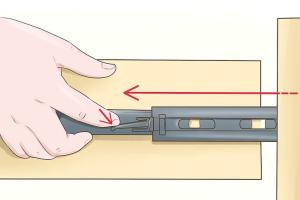Ultimate Guide: How to Easily Remove Drawers in Any Furniture

-
Quick Links:
- Introduction
- Understanding Drawer Types
- Tools Required
- Step-by-Step Guide to Removing Drawers
- Common Drawer Removal Issues
- Expert Insights and Tips
- Case Studies
- Safety Tips
- Conclusion
- FAQs
Introduction
Removing drawers from furniture is a common task in home maintenance, whether you're trying to fix a stuck drawer, replace hardware, or move your furniture. Although it may seem daunting, with the right knowledge and tools, you can efficiently remove drawers from any piece of furniture. This comprehensive guide will walk you through everything you need to know about drawer removal, including the types of drawers, required tools, step-by-step instructions, and expert tips to make the process as smooth as possible.
Understanding Drawer Types
Before we dive into the removal process, it’s essential to understand the different types of drawers you may encounter. Here are the main types:
- Traditional Drawers: These usually slide in and out on wooden or metal rails.
- Ball Bearing Drawers: These have metal slides with ball bearings that allow for smooth movement.
- European Style Drawers: These often do not have visible hardware and use a cam lock for support.
- Self-Closing Drawers: These automatically close themselves when pushed in slightly.
Understanding the type of drawer you're dealing with is crucial, as it will determine the removal technique you'll use.
Tools Required
To effectively remove drawers, you’ll need a few essential tools:
- Flathead screwdriver
- Phillips screwdriver
- Hammer (optional)
- Pliers
- Tape measure
- Lubricant (for sticky drawers)
Step-by-Step Guide to Removing Drawers
Step 1: Assess the Drawer Mechanism
Before removing a drawer, inspect it to understand how it operates. Look for visible screws or clips that may hold it in place.
Step 2: Remove Any Obstacles
Clear the area around the furniture. If the drawer is stuck due to items inside, remove them before proceeding.
Step 3: Locate the Release Mechanism
For ball-bearing or self-closing drawers, there’s usually a release lever. Slide the drawer out until you can see the mechanism.
Step 4: Use a Screwdriver to Remove Screws
If screws are holding the drawer in place, use the appropriate screwdriver to remove them.
Step 5: Gently Pull the Drawer Out
Once any screws or clips are removed, gently pull the drawer out. If it’s stuck, check for additional screws or use a lubricant.
Step 6: Examine and Repair (if needed)
After removing the drawer, check for any damage or issues that need addressing.
Common Drawer Removal Issues
While removing drawers, you might encounter a few common problems. Here’s how to tackle them:
- Stuck Drawers: Lubricate the rails with a silicone spray.
- Screws Stripped: Use a rubber band in the screw head to improve grip.
- Broken Hardware: Replace any broken parts before reassembling.
Expert Insights and Tips
Here are some expert tips that can help you during the drawer removal process:
- Always keep a small container to hold screws and small parts.
- Label parts if disassembling multiple drawers to avoid confusion.
- Take photos during the disassembly process for reference when reassembling.
Case Studies
Here are a few case studies demonstrating successful drawer removal:
- Case Study 1: A homeowner successfully removed a jammed drawer from a vintage dresser using a lubricant and patience.
- Case Study 2: A DIY enthusiast replaced broken slides on a kitchen drawer, enhancing its functionality significantly.
Safety Tips
Safety first! Here are some important safety tips to keep in mind:
- Always ensure the furniture is stable before removing drawers.
- Wear gloves to protect your hands from sharp edges.
- Keep your workspace tidy to avoid accidents.
Conclusion
Removing drawers does not have to be a challenging task. By understanding drawer types, having the right tools, and following the step-by-step guide, you can successfully remove and maintain your furniture for years to come. Remember to approach each project with patience and care, and don’t hesitate to seek expert advice when needed.
FAQs
1. How do I remove a drawer that is stuck?
Use a lubricant on the rails and gently wiggle the drawer while pulling it out.
2. What tools do I need to remove a drawer?
A flathead screwdriver, Phillips screwdriver, and pliers are generally sufficient.
3. Can I remove a drawer without damaging it?
Yes, by carefully following the removal steps and avoiding force.
4. How can I prevent drawers from sticking in the future?
Regularly clean the rails and apply silicone spray to keep them lubricated.
5. What if the screws are stripped?
Use a rubber band for extra grip or a screw extractor for removal.
6. Are there special considerations for antique furniture?
Yes, be extra cautious with antique pieces to avoid damage; consider consulting a professional.
7. How do I reassemble a drawer after removal?
Refer to your photos or labels from disassembly and reverse the steps taken.
8. What should I do if a drawer breaks during removal?
Assess the damage and consider repairing or replacing it as needed.
9. Can I remove a drawer from a built-in cabinet?
Yes, but make sure to check for any screws or clips holding it in place.
10. Is it necessary to remove drawers for cleaning?
While not required, it can greatly enhance the cleaning process.
For further reading, check out these resources:
- HGTV: 10 Tips for Fixing Sticky Drawers
- Family Handyman: How to Repair Drawers
- Better Homes & Gardens: How to Fix Sticky Drawers
Random Reads
- Setting up google voice
- Shut down dell inspiron laptop guide
- Play swf files without flash
- How to scan barcodes android
- How to scan document canon printer
- How to use digital camera as webcam
- How to use banana plugs
- How to use bittorrent
- How to upgrade pip
- How to upgrade your network to gigabit ethernet